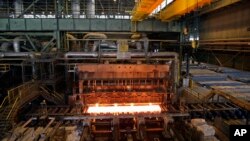This article originated in VOA’s Persian service. Farhad Pouladi contributed from Washington.
New U.S. sanctions targeting Iranian industrial metals will hit two of the country's most lucrative non-energy exports, according to Iranian government data seen by VOA Persian.
President Donald Trump signed an executive order Wednesday, seeking to deny Iran revenue from its exports of iron, steel, aluminum and copper. The measure blocks the assets of people involved in producing those metals inside Iran. It also authorizes sanctions against foreign financial institutions that sell goods and services to Iran to help it produce or export those metals.
An Iranian government trade report for the Persian year that ended March 20 shows iron, cast iron and steel were the nation’s fourth-biggest non-energy export, earning $3.8 billion. The report, published online by Iran’s Trade Promotion Organization, says iron, cast iron and steel accounted for 8% of Iran’s exports, excluding oil and gas, for the year. The $3.8 billion marked a 12% increase from the previous Persian year, the report also showed.
The same report also showed copper and copper products were Iran’s 10th-biggest non-energy export in the last Persian year, drawing $699 million in revenue, a 217% increase from the year before. That revenue accounted for 1.6% of Iran’s non-energy exports for the year.
Aluminum did not feature in the Iranian trade report’s list of the top 10 non-energy exports for the last Persian year.
Other nations 'on notice'
In his statement, Trump said Iranian exports of industrial metals accounted for 10% of its export economy. “Today’s action … puts other nations on notice that allowing Iranian steel and other metals into your ports will no longer be tolerated,” he said.
Washington has widened sanctions against Iran repeatedly over the past year, calling it part of a campaign to impose maximum pressure on Tehran to change perceived malign behavior.
Iranian Deputy Foreign Minister Sayyed Abbas Mousavi denounced the new U.S. sanctions, in remarks published by state media Thursday. "This measure of the United States is in violation of international obligations and it will be [held] responsible," Mousavi said. Iran has vowed to defy U.S. sanctions and rely on its own resources to sustain its economy.
Behnam Ben Taleblu, an Iran analyst at the Washington-based Foundation for Defense of Democracies (FDD), said Iran's industrial metals industry is one of several that U.S. officials can sanction in order to dry up revenues of the Islamic Revolutionary Guard Corps, the most powerful Iranian military branch, which Trump designated as a terrorist organization last month.
"Petrochemicals, in my view, is one [such industry], while metallurgy is another that contributes to Iran's [ballistic] missile efforts," Taleblu told VOA Persian at an FDD event Wednesday.
In a Thursday interview with VOA Persian, Patrick Clawson, research director for the Washington Institute for Near East Policy, said the new U.S. sanctions also would hurt Iran's labor market.
"They hit [economic] sectors that employ quite a few people in Iran and [that make] products used in metal industries such as the automobile industry," Clawson said. "So there are quite a few workers who could lose their jobs as a result of difficulties in these industries."
Iron
New York-based investment bank Jefferies said Iran's exports of iron ore were likely to collapse. "We had expected Iranian exports to increase to 20 million tonnes this year as a result of … supply issues [at a Brazilian iron ore mine operated by Vale SA]," Jefferies said in a Thursday note sent to news outlets. "Now, Iranian iron ore exports are likely to approach zero for as long as these sanctions last."
A Thursday report by Britain's Financial Times said the U.S. sanctions were likely to "further tighten" global supplies of iron ore, a key steelmaking ingredient, and drive its price up to $100 a tonne for the first time since May 2014. It said the commodity was currently trading at $95 a tonne.
In another report published Thursday, London-based commodity markets news service Argus said Iran exports 96% of its iron ore output, sending the vast majority of it, 94%, to China. It said another 2% of Iran's iron ore output is exported to India, Turkey, Egypt and Gulf Co-operation Council member states.
Steel
A U.S. Commerce Department report published in March said Iran exported 9.24 million tons of steel in 2018, a 24% increase by volume from the year before. It said Iran was the world's 18th-largest steel exporter in 2017, selling the metal to 120 countries and territories.
The Associated Press, in a Thursday report from Tehran, said Iran has dozens of mainly government-owned steel mills that employ about 50,000 workers. It said those mills have an annual output of 25 million tonnes of steel, with less than one-third of it being used for the domestic market to produce consumer goods and provide parts for offshore oil rigs, military vehicles and car manufacturing plants.
Copper
U.S. news agency Bloomberg published a Wednesday report citing Bloomberg Intelligence analyst Andrew Cosgrove as saying Iran's copper exports in 2018 amounted to 138,000 tonnes.
Aluminum
Texas-based research company Harbor Aluminum, in an email to VOA Persian, said Iran’s main customers for aluminum exports from 2013 to 2018 were Turkey, India, Taiwan, South Korea and China. It said the volume of Iran’s aluminum exports had fluctuated between 100,000 to 200,000 tonnes a year.










